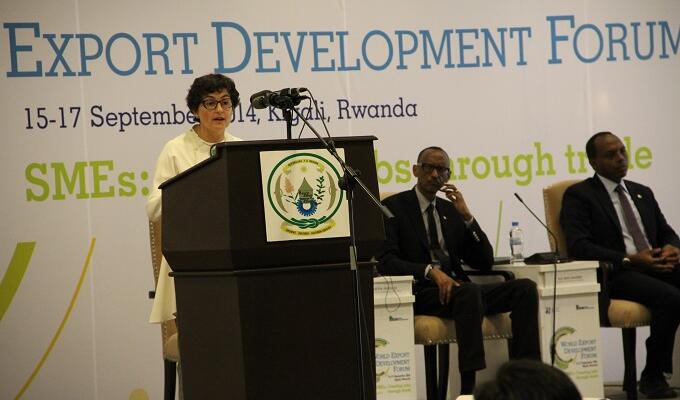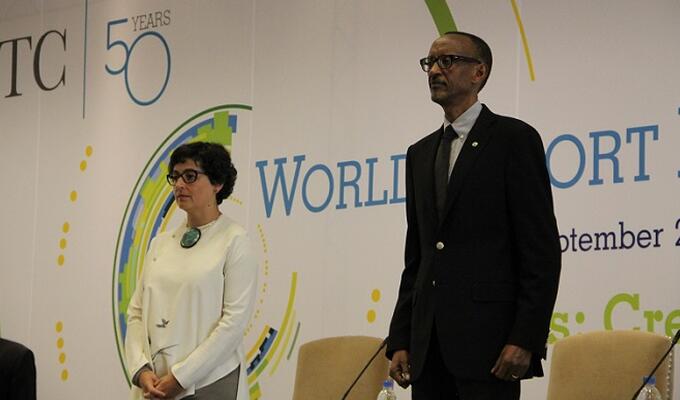

Welcome remarks by the ITC Executive Director at the World Export Development Forum (en)
Welcome remarks by the ITC Executive Director at the World Export Development Forum
16 September 2014, Kigali, Rwanda
(CHECK AGAINST DELIVERY)
His Excellency President of the Republic of Rwanda, Mr. Paul Kagame,
Distinguished guests,
All protocol observed
Ladies and gentlemen
Friends
Allow me to extend a very warm welcome to you all. I want to thank you for participating in ITC's flagship event - the World Export Development Forum -- which this year also features the Women Vendors' Exhibition Forum.
This is my first WEDF since taking the helm at ITC one year ago. It is also the first time that the ITC has taken this important event to Africa. For this, I want to extend special gratitude to the Government of Rwanda and in particular the Rwanda Development Board for partnering with the ITC to deliver the event. I want to extend a thank you for your presence- from nearby or far away.
Next week in New York, the world's leaders will gather to discuss the Post 2015 global development agenda. Eradicating extreme poverty in a sustainable manner by 2030 will be at the centre of these discussions.
Africa is a hugely important part of this global debate. It is the continent with both the most poverty but also the greatest promise. The enormous progress in reducing extreme poverty since the turn of this century must be celebrated. But multidimensional poverty remains higher in Sub-Saharan Africa than in other regions. It is now our task to focus on this our unfinished business.
Africa's potential is practically infinite. Sub-Saharan Africa is the world's second fastest-growing continent in economic terms. It's demographics are also promising. Technology and innovation are on the rise. Africa has become the 2nd most attractive investment destination in the world. Moreover, Africa's rapid urbanization, expanding middle class and increasing household expenditures are creating millions of consumers. I expect that the discussions over the next two days will provide both insights and pathways to turn this promise into a reality.
Ladies and Gentlemen, we are here because of trade's ability to transform lives and societies.
While businesses in Africa were until recently focused on the extractive sector; today the biggest opportunities lie in greater local value addition to Africa's assets in agri-food, manufacturing and more and more in services: ICT, health, tourism, education, professional, and infrastructure services among them. Services are crucial for many of African smaller, landlocked countries such as Rwanda.
This tangible promise is why WEDF 2014 is taking place in Africa, in Rwanda. Africa is already the global marketplace of the future.
It is now about turning local value addition into more jobs, sustained growth, and a more inclusive development. It is about trading these products and services in international markets- beginning with the markets in the region.
Central to this is partnerships. Partnership between policy makers and business. Between international development partners and local governments. Between global private sector actors and African SMEs. In Rwanda one of our most critical partnerships is with the One UN where the United Nations agencies are working together to deliver a coherent programme of assistance in the area of trade and development.
By 2030, we will need to generate an additional 500 million jobs to keep up with growth in the world's working-age population. More and better jobs will mean the difference between a demographic dividend and a social time bomb.
The lion's share of these jobs will be generated by SMEs since they account for most jobs, and generate the majority of new ones. This is why SMEs figure at the heart of ITC's work. We know the impact that successful SMEs have on job creation in developing countries. In Africa alone there are over 50 million micro, small, and medium-sized enterprises, which employ close to 60% of the workforce.
Seizing the opportunities created by rapid growth requires market-led training and skills building for local and regional SMEs to capitalize and internationalize. Getting SMEs to internationalise is important because the more that African SMEs can integrate into regional and global value chains, the better the chances that they will be able to generate higher-quality jobs and reduce the informal sector.
In ITC we work with policymakers and SMEs to diversify into new products and services; we build capacities in value addition and branding; we help buyers and sellers connect; we support regional economic integration efforts; we also work with multinationals to build curriculum and real-life shop-floor trainings to benefit young companies and aspiring entrepreneurs. In short, we build international SME competitiveness.
It is in this spirit that I am pleased to announce the launch of ITC's on-line e-learning SME Trade Academy, which will as of today be accessible to all from our website. The e-learning platform puts ITC's expertise in the hands of entrepreneurs who want to tap into potential trade opportunities through practical online training and export related courses coupled with mentoring.
Over the next two days; we will be 'talking trade' and 'doing business'. Leading thinkers and practitioners will share their visions for how SMEs can effectively live up to their promise as vectors for growth, job creation, and development. But thinking and sharing alone are not enough to leapfrog SMEs into a position where they can realise their full potential. We - you - will need to use this time here in Kigali to discover new business opportunities and conclude new deals. It is about "doing business".
Here in Kigali, we must drill down to what it takes to accelerate trade facilitation, regional integration and south-south cooperation.
We must also explore innovative ways to tackle the lack of finance that frustrates the growth prospects of many SMEs in Africa, not least by tapping into impact investment funds. We need to build on the nascent successes of SME incubators, particularly in the technology sector. Collectively, we need to brainstorm about how SMEs can meet sustainability standards and create brands that will enhance their competitiveness and job-creating power. We need to look at linking tourism with local development.
But this week is also about 'Doing business'. Both formally and informally we will be connecting buyers with sellers and helping to move ideas to implementation.
At the heart of these B2B meetings here will be some 400 women-owned companies from across the globe. These companies are keen to expand their trade, not only in selling more but also in building new networks, spurring innovation, building their brand and finding solutions to increase their reach.
Women's entrepreneurship is key to women's empowerment. And women's economic empowerment means development since women reinvest up to 90% of their earnings in nutrition, health, and education for their families, compared to 40% for men. Better prospects for women-owned SMEs will mean better prospects for future generations.
Here again it is an honour to be in Rwanda, which leads the world in the proportion of women in national parliament, The fact that more than 60% of Rwandese MPs are women cannot be disassociated from the country's astonishing economic performance in developing business and supporting women entrepreneurs in particular.
Ladies and Gentlemen, we are here because we want to connect more SMEs to international markets. For a woman who trades rice informally between Rwanda and Burundi, simpler border procedures - and a bit of help learning of how to use them - can mean increased income and lower risks. And when firms can break into world markets for value-added goods and services, it can transform more than an individual's livelihood. In the past fifty years, we have seen countries use trade to drive their rise from poverty to relative prosperity in the space of a generation. And a better future for Africa is a better future for the international community.
The Millennium Development Goals (MDGs) spurred action in addressing poverty. But must now tackle the unfinished development challenge by focusing efforts on entrepreneurship, trade, SMEs, and women economic empowerment. I count on all Governments in this room to champion this.
Entrepreneurship is more than just starting a business. It is about creating livelihoods, realising innovation and supporting the dignity of the individual. It is about inclusiveness. It is about participation. It is about connecting to global markets. It is a contribution to the global commons and the global efforts to address poverty.
I wish us all productive and fruitful deliberations and am pleased to announce that we are ready for business. Rwanda is ready for business. Africa is ready for business. WEDF is ready for business.
Thank you



